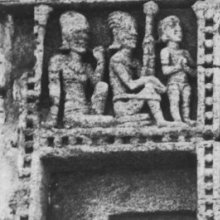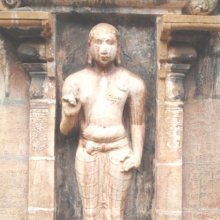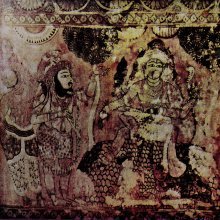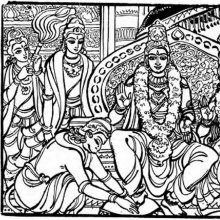Devotion, Devoted: 2 definitions
Introduction:
Devotion means something in Hinduism, Sanskrit. If you want to know the exact meaning, history, etymology or English translation of this term then check out the descriptions on this page. Add your comment or reference to a book if you want to contribute to this summary article.
Images (photo gallery)
(+55 more images available)
In Hinduism
Yoga (school of philosophy)
Source: ORA: Amanaska (king of all yogas): A Critical Edition and Annotated Translation by Jason Birch1) Devotion (to gnosis) is denoted by the Sanskrit term Bhakti, according to the Śivayogadīpikā by Sadāśivayogīśvara: a text dealing with Śaivism and Haṭhayoga in two hundred and eighty-nine verses.—Accordingly, while discussing the difference between Rājayoga and Śaivayoga: “[...] Devotion (bhakti) is gnosis full of Śiva, and Śaiva gnosis is Śiva’s nature. Since Śaiva observance is worship of Śiva, Śiva's yoga is five-fold. He who is without the practice [of worshipping] Śiva is certainly a bound soul, and he goes round and round forever in this cycle of birth and death”.
2) Being Devoted (to a particular practice) is denoted by the Sanskrit term Rata, according to the Amanaska Yoga treatise dealing with meditation, absorption, yogic powers and liberation.—Accordingly, as Īśvara says to Vāmadeva: “[...] Some are devoted (rata) to Mantra Yoga, some are confused by meditation and some tormented by forceful [practices]. They do not know what causes one to cross over [to liberation]. [...]”.

Yoga is originally considered a branch of Hindu philosophy (astika), but both ancient and modern Yoga combine the physical, mental and spiritual. Yoga teaches various physical techniques also known as āsanas (postures), used for various purposes (eg., meditation, contemplation, relaxation).
Shaktism (Shakta philosophy)
Source: ORA: Amanaska (king of all yogas): (shaktism)Devotion (to a particular observance) is denoted by the Sanskrit term Nirata, according to the 17th century Kaulagajamardana (“crushing the Kaula elephant”) authored by Kāśīnātha or Kṛṣṇānandācala.—Accordingly, [as Īśvara said to Pārvatī]: “Listen, O Pārvatī, I shall give a critique of the Pāṣaṇḍas. Knowing this, a wise man is not defeated by them. Those devoted to fake observances (kalpita-ācāra-nirata); those who rebuke the religion of the Vedas; those who have fallen from caste and religious duties; those who have erred and think themselves learned, they are [all] called Pāṣaṇḍas [because] they act contrary to [true] religion. They fall into a terrifying hell until the end of the world. [...]”

Shakta (शाक्त, śākta) or Shaktism (śāktism) represents a tradition of Hinduism where the Goddess (Devi) is revered and worshipped. Shakta literature includes a range of scriptures, including various Agamas and Tantras, although its roots may be traced back to the Vedas.
See also (Relevant definitions)
Partial matches: Devotion, Te.
Query error!
Full-text (+7544): Bhakti, Bhaktiyoga, Nishtha, Bhakta, Bhaktihina, Abhakti, Nirata, Pativrata, Rata, Bhaktimat, Pitribhakti, Samanuvrata, Patiseva, Parayana, Sadhaka, Sangin, Kritahaka, Bhava, Brahmayoga, Bhartrivrata.
Relevant text
Search found 515 books and stories containing Devotion, Devoted, Devotions, The devotion; (plurals include: Devotions, Devoteds, Devotionses, The devotions). You can also click to the full overview containing English textual excerpts. Below are direct links for the most relevant articles:
Vishnu Purana (by Horace Hayman Wilson)
Chapter XII - Dhruva commences a course of religious austerities < [Book I]
Chapter VII - Descriptions of Brahma-yoga < [Book VI]
Manusmriti with the Commentary of Medhatithi (by Ganganatha Jha)
Verse 2.69 < [Section XVI - General Duties of Twice-born Men]
Verse 4.94 < [Section XI - Daily Duties]
Verse 6.83 < [Section VII - Means of Removing Sin (kilbiṣa)]
Rig Veda (translation and commentary) (by H. H. Wilson)
Mahabhagavata Purana (translation and study) (by Prabir Kumar Nanda Goswami)
Chapter 28 - The auspicious marriage ceremony of Parvati
Chapter 18 - Advice of Moksha Yoga
Baudhayana Dharmasutra (by Georg Bühler)
Brihat Jataka by Varahamihira [Sanskrit/English] (by Michael D Neely)
Verse 15.2 < [Chapter 16 - Results of the Nakshatras]
Verse 16.6 < [Chapter 17 - Results of the Moon in the Zodiac Signs]
Verse 19.8 < [Chapter 20 - Houses]
Related products
(+17 more products available)










